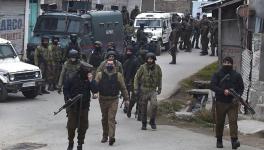Protests Over Economic Decline Continue for Third Day in Tunisia; Hundreds Arrested
(Photo: Middle East Online)
Popular protests across Tunisia over the deteriorating economic situation continued for the third straight day on Monday January 18. Government authorities responded by arresting over 600 protesters for alleged acts of looting, vandalism, damage to public and private property and other violent acts, multiple news reports stated. Tunisian security forces have reportedly resorted to violent methods to break up and suppress the protests. Several human rights organizations issued statements of condemnation, urging the authorities to exercise restraint, especially when dealing with the majority of peaceful and unarmed protesters.
According to spokesperson for the interior ministry Khaled Hayouni, 632 people have been arrested for offenses ranging from “burning tires, bins” to “trying to block the movement of security forces during the ongoing protests.” Police authorities have issued a contradictory statement, claiming to have arrested over 1,000 protesters. Human rights group Amnesty International has claimed that many of the arrested protesters are minors between the ages of 14 and 15.
Amnesty demanded that the government authorities “refrain from using excessive force” against the protesters and to respect their human and civil rights. Amnesty deputy regional director for Middle East and North Africa, Amna Guellali said in a statement, “even when acts of vandalism and looting occur, law enforcement must only use force where absolutely necessary and proportionate. Nothing gives security forces permission to deploy unnecessary and excessive force including when they are responding to acts of sporadic violence.”
The ongoing protests spanning the entire country are taking place around the time of the tenth anniversary of the Tunisian revolution which resulted in the overthrow of dictator Zine El Abidine Ben Ali in 2011. Demonstrations have been reported from the cities Sousse, Kalaa Kebira, Sidi Bouzid, Bizert, Kasserine, Seliana, and capital Tunis, among others. The protesters are overwhelmingly from the poor, marginalized and working class sections.
Tunisians have been consistently protesting over a broad range of socio-economic and political issues affecting their lives and the government’s abject failure and apathy in addressing them. The national GDP shrank by 9% last year. There is widespread unemployment especially among the youth, with one in every three Tunisians unemployed. This is compounded by rapidly rising inflation, poor government services, and longstanding issues of corruption and state oppression.
Protesters are also opposing the latest four-day lockdown announced to control COVID-19 infections. The pandemic has further contributed to economic decline, severely impacting the vital tourism industry which provides employment to millions of Tunisians. The country has so far recorded more than 177,000 COVID-19 cases and over 5,600 deaths. The pandemic has led to a huge outflow of Tunisians from the country. As per reports, over 10,000 Tunisians left Tunisia and arrived in Italy on boats in 2020.
Courtesy: Peoples Dispatch
Get the latest reports & analysis with people's perspective on Protests, movements & deep analytical videos, discussions of the current affairs in your Telegram app. Subscribe to NewsClick's Telegram channel & get Real-Time updates on stories, as they get published on our website.
























